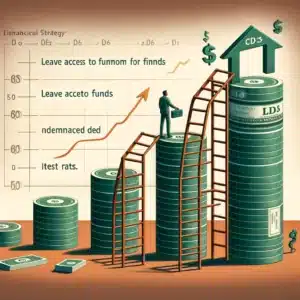Certificate of Deposit (CDs) offer a secure and predictable way to grow your savings, providing fixed interest rates over a predetermined term.
Unlike traditional savings accounts, a CD has a fixed interest rate and a specified withdrawal date, known as the maturity date. This makes investing in CDs a stable and predictable choice for those looking to save money over a short to medium term.
If you are looking to invest as an expat or high-net-worth individual, which is what I specialize in, you can email me (advice@adamfayed.com) or WhatsApp (+44-7393-450-837).
This page explores the following topics:
- Certificate of deposit definition
- How does a certificate of deposit work
- Certificate of deposit rates
- Early Withdrawal Strategies for CDs
- Laddering Your CDs
- Certificate of Deposit Pros and Cons
- Types of CDs
- Best certificate of deposit
- Traditional CD vs Brokered CD
- How to choose a certificate of deposit
Certificate of Deposit Definition

A certificate of deposit is a financial product offered by banks and credit unions that provides an interest rate premium in exchange for the customer agreeing to leave a lump-sum deposit untouched for a predetermined period.
Unlike traditional savings accounts, a CD has a fixed interest rate and a specified withdrawal date, known as the maturity date. This makes investing in CDs a stable and predictable choice for those looking to save money over a short to medium term.
The Federal Deposit Insurance Corporation (FDIC) or the National Credit Union Administration (NCUA) typically insures CDs, offering investors a high level of security on their deposits up to the applicable limits.
How Does a Certificate of Deposit Work?
The mechanics of a certificate of deposit revolve around the agreement between the investor and the financial institution.
When you purchase a CD, you commit to depositing a specific amount of money for a fixed period, which can range from a few months to several years. In return, the bank guarantees a fixed interest rate over the life of the CD, which is usually higher than those offered on standard savings accounts.
Purchasing a CD
Investors purchase CDs directly from banks or credit unions. The process involves selecting the desired term length and depositing the funds. The minimum deposit amount can vary significantly from one institution to another, affecting the accessibility of CDs to different investors.
Terms and Interest
The term of a CD can vary widely, typically from three months to five years, with the interest rate fixed for the duration. Interest on CDs compounds over time, meaning it is calculated periodically and added to the principal amount of the deposit, thereby earning more interest.
Payouts and Maturity
As CDs reach maturity, investors face a choice: withdraw the principal and the interest earned or renew the CD for another term. Some institutions offer a grace period after maturity during which the CD holder can make this decision without facing penalties.
If no action is taken, the CD may automatically renew for the same term at the current interest rate offered by the bank.
Certificate of Deposit Typical Minimum Balance
The certificate of deposit’s typical minimum balance requirement varies widely among banks, influencing accessibility for potential investors. High minimum balance requirements generally cater to more affluent investors, offering higher interest rates as an incentive for larger deposits.
Those with limited funds might seek banks offering lower minimum balances to start earning interest without needing a substantial initial investment.
Conversely, investors with more substantial capital might opt for CDs with higher minimum balances to take advantage of potentially better interest rates.
Certificate of Deposit Rates

Several key factors influence these rates:
- Term Lengths: The duration of a certificate of deposit significantly impacts its interest rate. Generally, longer-term CDs offer higher rates than shorter-term CDs, as banks reward investors for locking in their funds for extended periods of time.
- Market Conditions: In times of economic prosperity, banks may offer higher interest rates to attract deposits, which they can then lend out at higher rates. Conversely, in a sluggish economy, CD rates might drop as loan demand decreases and banks require less capital from depositors.
- Federal Reserve Policies: The Federal Reserve‘s monetary policy decisions, especially regarding the federal funds rate, directly influence CD rates. When the Fed raises its target interest rate, banks typically increase the rates they offer on CDs. This adjustment is a response to the higher borrowing costs banks face, as they aim to attract more deposits to fund loans at profitable rates.
Certificate of Deposit Calculator
A certificate of deposit calculator is an invaluable tool for investors looking to gauge the future value of their CD investment.
To use the calculator, follow these steps:
- Enter the Deposit Amount: Start by inputting the initial amount of money you plan to invest in the certificate of deposit. This is the principal amount that will accrue interest over the term of the CD.
- Specify the Interest Rate: Input the annual interest rate offered by your CD. The rate can vary significantly depending on the bank, the term length of the CD, and prevailing market conditions. Remember, the higher the rate, the more interest you will earn.
- Set the Term Length: Enter the duration of your CD investment, typically expressed in months or years. The term length is crucial as it affects not only how long your money will be locked away but also how much interest it will accumulate.
- Frequency of Compounding: Select how often the interest on your CD will compound. Common compounding frequencies include daily, monthly, quarterly, or annually. More frequent compounding periods can lead to higher interest earnings due to the effect of compounding interest.
- Calculate: After entering all the necessary information, hit the calculate button. The certificate of deposit calculator will then display the future value of your investment, including the total interest earned over the term of the CD.
How to Compute Expected CD Returns
To compute the expected returns on a certificate of deposit manually, you can use the formula for compound interest: A = P(1 + r/n)^(nt), where:
For example, if you invest $10,000 in a certificate of deposit with an annual interest rate of 2% compounded monthly (n=12) for 3 years (t=3), you would calculate the future value as follows: A = $10,000(1 + 0.02/12)^(12*3), resulting in a total amount of approximately $10,610.08.
Early Withdrawal Strategies for CDs
Withdrawing from a certificate of deposit before its maturity date usually incurs financial penalties, which can significantly affect your overall returns. These penalties often equate to several months’ worth of interest, depending on the CD’s term and the bank’s policies.
However, understanding when and how to strategically manage an early withdrawal can minimize these losses.
For instance, if facing an unexpected financial need, compare the penalty costs against potential gains from alternative investments or the interest costs of borrowing funds.
In some cases, the penalty may be less detrimental to your financial health than other options. Additionally, some banks offer CDs with more lenient early withdrawal penalties, which can be a prudent choice if you anticipate a possible need for early access to your funds.
To mitigate losses from early withdrawals, investors should carefully review the terms and conditions of their certificate of deposit, focusing on the penalty clauses.
Opting for CDs with lower early withdrawal penalties or those that offer a grace period after purchase during which the CD can be canceled without penalty can provide flexibility.
Moreover, maintaining a portion of your savings in more liquid accounts ensures you have accessible funds for emergencies, reducing the need to break a CD.
Laddering Your CDs

Laddering your certificates of deposit is a strategic method to enhance interest income while preserving access to part of your investment. This technique involves opening multiple CDs with different maturity dates, effectively creating a staggered portfolio of short-, medium-, and long-term CDs.
By doing so, you can capitalize on the typically higher interest rates offered by longer-term CDs, while the staggered maturities ensure that you regularly have access to some of your funds without incurring early withdrawal penalties.
Creating a CD ladder allows investors to adapt to changing interest rates more flexibly. As each CD matures, you can choose to reinvest the funds in a new long-term CD to maintain the ladder, potentially at a higher interest rate if rates have risen.
This approach not only maximizes potential returns over time but also mitigates the risk of locking in all your funds at lower rates.
Additionally, the regular maturation of CDs in the ladder provides periodic liquidity, offering a balance between the desire for higher yields and the need for access to funds.
Certificate of Deposit Pros and Cons
CDs provide a definite return, low-risk investment choice that is protected by federal deposit insurance.
Nevertheless, the profits could be lower than those of other investments, and the fact that the money is locked in for a set period reduces its flexibility and liquidity.
Types of CDs
There are various types of CDs, including:
- No-penalty CDs
- Bump-up CDs
- Step up CDs
- Callable CDs
- Add-on CDs
- Jumbo CDs
- Brokered CDs
Each type suits different investment needs.
Best Certificate of Deposit
The best certificate of deposit combines competitive interest rates, favorable terms, and minimal penalties for early withdrawal.
High-interest rates ensure that your money grows at an optimal pace, outpacing inflation and increasing your savings. Favorable terms, typically ranging from a few months to several years, allow you to align your financial goals with your liquidity needs.
Finally, minimal penalties for early withdrawal offer flexibility, ensuring that you can access your funds without losing a significant portion of your interest earnings in case of an emergency.
Bank of America Certificate of Deposit
Bank of America CDs typically feature a variety of term lengths, from short-term options of a few months to longer terms of several years, catering to different investor timelines.
While the interest rates may vary based on the term length and market conditions, Bank of America often provides promotional rates for new deposits or for customers with existing accounts, adding value to their CD offerings.
Chase Certificate of Deposit
Chase’s certificates of deposit stand out for their flexibility and special offers. With a wide array of terms available, Chase aims to accommodate both short-term savers and those looking for longer investment horizons.
Chase occasionally introduces special promotional rates for new CD accounts, especially for customers who maintain a broader banking relationship with them. These CDs are designed to be accessible, with options for low minimum deposits, making them an attractive choice for savers at all levels.
Capital One Certificate of Deposit
Capital One CDs have competitive interest rates, which often rank among the highest available, providing substantial growth for your savings. Furthermore, Capital One CDs come with no minimum deposit requirement, making them accessible to a broad range of investors.
The flexibility to choose from a wide range of terms, from a few months to several years, allows investors to tailor their investments according to their financial goals and timelines.
Traditional CD vs Brokered CD
Traditional Certificate of Deposit

Traditional bank CDs are time deposits offered directly by banks and credit unions. Investors commit their funds for a fixed period, ranging from a few months to several years, in exchange for a guaranteed interest rate.
One of the primary advantages of traditional bank CDs is their straightforward nature; you deposit your money, wait for the term to end, and then collect your principal plus interest.
However, traditional CDs often come with early withdrawal penalties, which can significantly impact your earnings if you need to access your funds before the term expires.
The interest rates for traditional bank CDs can also be lower compared to other investment options, especially in low-interest-rate environments.
Brokered Certificate of Deposit
Brokered CDs are certificates of deposit that are bought and sold through brokerage firms. They offer several unique advantages, including the potential for higher interest rates and greater flexibility in terms of buying and selling.
Brokered CDs can be sold on the secondary market before their maturity date, which can provide investors with more liquidity than traditional CDs.
However, the safety and security of brokered CDs can vary, as they are not directly insured by the FDIC or NCUA. Instead, the insurance applies to the original issuer of the CD, and investors must rely on the broker’s due diligence.
Additionally, the secondary market for brokered CDs can fluctuate, meaning that selling a CD before its maturity could result in a loss if the market conditions are not favorable.
How to choose a certificate of deposit
Think about the duration, kind, and rate of a CD before selecting one. Verify that the rates offered by various institutions correspond with your savings targets before making a deposit. To reduce risk, make sure your entire deposit stays within the insurance cap.
Pained by financial indecision?

Adam is an internationally recognised author on financial matters with over 830million answer views on Quora, a widely sold book on Amazon, and a contributor on Forbes.

